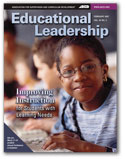September 2007
Teachers as Leaders
This issue will address the roles of teachers as leaders in 21st-century schools. How can teachers and principals effectively share leadership? What does teacher-led school improvement look like? What supports do teachers need to flourish? What is the role of the principal in mentoring teachers and reshaping professional development? What does research tell us about teacher leadership? How can teachers thrive in challenging school environments? We welcome articles that show how leaders influence school capacity for change, professionalism, instructional improvement, and student learning.
Deadline: April 2, 2007
October 2007
Early Intervention at Every Age
The right intervention at the right time can boost students toward higher achievement or prevent a slide to failure. This issue will look at ways to identify and address learning challenges and facilitate learning for students from early childhood through adolescence. How can educators improve preschoolers' cognitive and language competencies? Which strategies lead to early identification of learning disabilities or special learning needs? Which interventions in middle and secondary school increase high school completion rates? We will include articles on programs that help students navigate transitions successfully.
Deadline: May 1, 2007
November 2007
Making Math Count
Advanced math skills aren't just for the select few anymore. Today's information society requires all students to solve problems, reason effectively, and make logical connections. How can teachers raise standards, and, at the same time, make math accessible to all? How can schools bring coherence to the diverse mathematics curriculums currently in use? Close achievement gaps? Strengthen teachers' content knowledge? What instructional strategies, grouping methods, and assessments have proven most effective? How can teachers link classroom activities in math to high-stakes tests? Should all students be on the college track? International perspectives are welcome.
Deadline: June 1, 2007
December 2007/January 2008
Informative Assessment
Unlike assessments that merely summarize students' achievement at the end of a marking period, formative assessments help educators predict whether students are on track toward meeting goals. This issue will look at how to use activities, tests, and daily practices that tell teachers how to intervene appropriately. Topics will include examining student work, effective questioning, meaningful feedback, student self-assessment, peer assessment, benchmark tests, performance assessments, grading, and the role of homework. How can educators determine whether tests billed as “formative” are truly informative? We will be looking for articles that help readers use formative assessment to promote learning, improve instruction, raise achievement, and narrow achievement gaps.
Deadline: July 1, 2007
February 2008
Teaching Students to Think
This issue will explore the ways that schools can encourage students to become better critical and creative thinkers. What does higher-order thinking in various curriculum subjects look like? What kind of thinking will be most important in the future? For producing thoughtful citizens of the world? How can teachers help students learn to think for themselves, using techniques that support efficient and effective thinking? How can instruction that encourages creativity and divergent thinking enhance academic rigor?
Deadline: September 3, 2007
March 2008
Reaching the Reluctant Learner
This issue will explore why some students are reluctant to participate in school and what educators can do to help. What kinds of environments, teaching strategies, and classroom climates contribute to engagement in and excitement about learning? What strategies have proven most effective for motivating students? Are extrinsic motivators worthwhile, or should teachers focus on making their curriculums more compelling? How can teachers capitalize on students' interests and meet school curriculum goals? What do students say about what motivates them?
Deadline: October 1, 2007
April 2008
Poverty and Learning
What is the complex relationship between poverty and school success? This issue will explore how schools are addressing obstacles to academic success often associated with poverty—including high student mobility rates, poor health care and nutrition, low parental academic achievement, homelessness, inadequate teacher preparation, and troubled communities. Articles will discuss a wide range of approaches, such as improving school readiness of young children, making school a place where all students feel supported, and putting students on an accelerated track to college. We are also interested in articles describing the broader social context of poverty as well as international comparisons of education policies related to poverty and learning.
Deadline: November 1, 2007
May 2008
Reshaping High Schools
Most high schools still operate according to long-standing conventions about how instruction should be delivered, with learning divided into disciplines and time slots. How can high schools move past outdated models and band-aid reforms? What kind of core curriculum should we have, and how can we structure learning to promote the overarching skills and flexibility students need for the new workplace? We welcome articles describing successful and replicable models of learning environments—from small schools to early college high schools to virtual learning and tech-prep options.
Deadline: December 3, 2007
